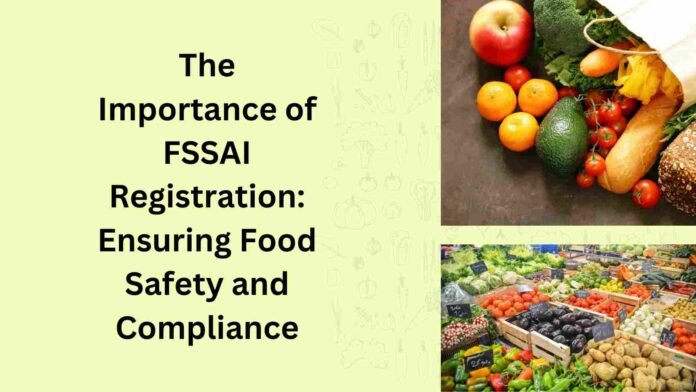Food Safety and Standards Authority of India (FSSAI) registration is a critical requirement for any business involved in food processing, manufacturing, distribution, or sale. It’s not just a legal obligation but also a fundamental step towards ensuring food safety and compliance with regulatory standards. In this article, we’ll delve into why FSSAI registration is so crucial for food businesses and the role it plays in safeguarding public health.
FSSAI registration is mandatory for all food businesses, regardless of their size or scale of operation. Whether you’re a small-scale cottage industry producing homemade snacks or a large multinational corporation manufacturing packaged foods, compliance with FSSAI regulations is non-negotiable. Here’s why FSSAI registration is of utmost importance:
1. Ensuring Food Safety:
FSSAI registration ensures that food businesses adhere to strict quality control measures and hygienic practices during the manufacturing, processing, packaging, and storage of food products. This helps in preventing contamination, adulteration, and the spread of foodborne illnesses.
2. Legal Compliance:
Operating without FSSAI registration is not only unethical but also illegal. Non-compliance can lead to hefty fines, product recalls, or even the closure of the business. FSSAI registration provides legal recognition and credibility to food businesses, instilling trust among consumers.
3. Consumer Trust and Confidence:
In today’s competitive market, consumers are becoming increasingly conscious about the quality and safety of the food they consume. FSSAI registration serves as a mark of assurance that the food products comply with regulatory standards and are safe for consumption. This builds trust and confidence among consumers, leading to brand loyalty and repeat purchases.
4. Access to Wider Markets:
FSSAI registration opens doors to national and international markets by ensuring compliance with food safety standards recognized globally. Many retailers, supermarkets, and online platforms require FSSAI registration as a prerequisite for listing products, thus expanding the market reach of registered food businesses.
5. Quality Assurance and Standardization:
FSSAI registration plays a pivotal role in maintaining consistency and standardization across the food industry. By setting stringent quality parameters and guidelines, FSSAI ensures that food products meet the prescribed standards for ingredients, labeling, packaging, and manufacturing processes. This not only enhances the overall quality of food products but also fosters fair competition among businesses, leveling the playing field for both established players and emerging entrepreneurs.
6. Traceability and Accountability:
FSSAI registration mandates thorough documentation and record-keeping by food businesses, including details of raw materials, production processes, and distribution channels. This enables effective traceability in case of any food safety incidents or recalls, ensuring swift and targeted action to mitigate risks and protect consumers. Additionally, FSSAI registration holds businesses accountable for the safety and integrity of their products, promoting transparency and ethical practices throughout the supply chain.
7. Public Health Protection:
At its core, FSSAI registration is driven by the overarching goal of safeguarding public health and well-being. By enforcing stringent food safety standards and regulations, FSSAI mitigates the risk of foodborne illnesses, allergies, and other health hazards associated with contaminated or substandard food products. This proactive approach not only protects consumers from harm but also contributes to the overall improvement of public health indicators and quality of life.
8. Continuous Improvement and Innovation:
FSSAI registration encourages continuous improvement and innovation within the food industry by fostering research and development initiatives aimed at enhancing food safety and quality standards. Registered food businesses are incentivized to invest in new technologies, processes, and practices that promote safer and more sustainable food production methods. This culture of innovation not only benefits consumers but also drives economic growth and competitiveness in the global market.
Conclusion:
In essence, FSSAI registration serves as a linchpin in the overarching framework of food safety, regulatory compliance, and consumer protection. Its multifaceted role encompasses quality assurance, standardization, traceability, public health protection, and innovation within the food industry. By upholding the principles of FSSAI registration, food businesses not only fulfill their legal obligations but also contribute to the larger mission of ensuring safe, nutritious, and wholesome food for all. As we navigate the complexities of an evolving food landscape, FSSAI registration remains steadfast in its commitment to promoting food safety, integrity, and trustworthiness across the food supply chain.





